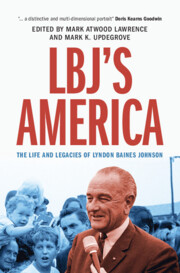Book contents
- LBJ’s America
- LBJ’s America
- Copyright page
- Contents
- Illustrations
- Contributors
- Introduction
- Chapter 1 Power and Purpose: LBJ in the Presidency
- Chapter 2 LBJ and the Contours of American Liberalism
- Chapter 3 Lyndon Johnson and the Transformation of Cold War Conservatism
- Chapter 4 The Great Society and the Beloved Community: Lyndon Johnson, Martin Luther King Jr., and the Partnership That Transformed a Nation
- Chapter 5 Lyndon Johnson, Mexican Americans,and the Border
- Chapter 6 The War on Poverty: How Qualitative Liberalism Prevailed
- Chapter 7 LBJ’s Supreme Court
- Chapter 8 “If I Cannot Get a Whole Loaf, I Will Get What Bread I Can”: LBJ and the Hart–Celler Immigration Act of 1965
- Chapter 9 “It’s Always Hard to Cut Losses”: The Politics of Escalation in Vietnam
- Chapter 10 Lyndon Johnson and the Shifting Global Order
- Chapter 11 “Through a Narrow Glass”: Compassion, Power, and Lyndon Johnson’s Struggle to Make Sense of the Third World
- Afterword: LBJ’s America
- Acknowledgments
- Notes
- Index
Chapter 11 - “Through a Narrow Glass”: Compassion, Power, and Lyndon Johnson’s Struggle to Make Sense of the Third World
Published online by Cambridge University Press: 19 October 2023
- LBJ’s America
- LBJ’s America
- Copyright page
- Contents
- Illustrations
- Contributors
- Introduction
- Chapter 1 Power and Purpose: LBJ in the Presidency
- Chapter 2 LBJ and the Contours of American Liberalism
- Chapter 3 Lyndon Johnson and the Transformation of Cold War Conservatism
- Chapter 4 The Great Society and the Beloved Community: Lyndon Johnson, Martin Luther King Jr., and the Partnership That Transformed a Nation
- Chapter 5 Lyndon Johnson, Mexican Americans,and the Border
- Chapter 6 The War on Poverty: How Qualitative Liberalism Prevailed
- Chapter 7 LBJ’s Supreme Court
- Chapter 8 “If I Cannot Get a Whole Loaf, I Will Get What Bread I Can”: LBJ and the Hart–Celler Immigration Act of 1965
- Chapter 9 “It’s Always Hard to Cut Losses”: The Politics of Escalation in Vietnam
- Chapter 10 Lyndon Johnson and the Shifting Global Order
- Chapter 11 “Through a Narrow Glass”: Compassion, Power, and Lyndon Johnson’s Struggle to Make Sense of the Third World
- Afterword: LBJ’s America
- Acknowledgments
- Notes
- Index
Summary
This chapter explores the limits of Lyndon Johnson’s capacity to empathize with and understand the peoples of the decolonizing world during his presidency and the implications of his experience for the America he left behind. It traces Johnson’s view of the decolonizing world in the context of the Cold War, showing how his understanding of revolutionary nationalism and the social, political, and economic problems left behind by European colonialism evolved – or failed to evolve – alongside his increasingly progressive definition of democracy at home. Acknowledging his truly ambitious vision of a “global Great Society,” which promised innovative global health, education, and anti-poverty initiatives to the Third World, the chapter ultimately shows how Johnson failed to fulfill his promises to redefine US national interests in the world around compassion for the marginalized. Instead, in his dealings with Third World leaders, he often reverted to the kind of transactional power politics that had served him so well in the Senate, failing to see how central the value of self-determination was to anti-colonial movements and their representatives. In the final analysis, this chapter uses Johnson’s example to investigate the limitations of compassion in US foreign relations more broadly.
Keywords
- Type
- Chapter
- Information
- LBJ's AmericaThe Life and Legacies of Lyndon Baines Johnson, pp. 281 - 302Publisher: Cambridge University PressPrint publication year: 2023



